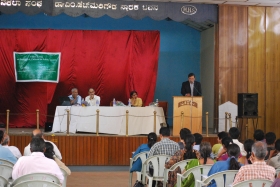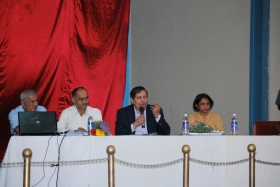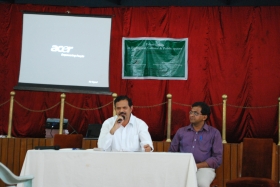Lakes
Campaign against Lake Privatisation in Bangalore
Public Action
Karnataka Lokayukta calls for active Public Action to save Bangalore Lakes
Report of workshop on "Urban Lakes as Ecological, Cultural and Public Spaces"
Organised by
Environment Support Group
in collaboration with
Karnataka State Council for Science and Technology
Dr. H. Marigowda Hall, Lalbagh, Bangalore
26 September 2009
(download report - PDF, 160 KB)
Environment Support Group in collaboration with Karnataka State Council for Science and Technology organised a day long workshop on "Urban Lakes as Ecological, Cultural and Public Spaces" today (26 September 2009) at the Dr. Marigowda Hall, in Lalbagh, Bangalore.
Hon'ble Lokayukta of Karnataka, Justice Santosh Hegde addresses the gathering
Seated from Left: Dr. Subramanya, noted ornithologist; Dr. D. S. Ravindran, IFS, and Dr. Esha Shah of the University of Sussex.
Justice Hegde attributed the problems facing Bangalore�s lakes to the negligent attitudes of short-sighted politicians and an unconcerned bureaucracy. He claimed that faulty governance and overcrowding of the city beyond its infrastructural capacities were both to blame for the death of the city�s lakes. The only hope he saw was in people organising themselves to question the absolute collapse of the governance systems and engaging with each and every public action, demanding transparency, exposing corruption and ensuring only that development would take place that truly benefits the people. He spoke with alarm that less than 15% of public expenditure truly meets public objectives and cited the recent CAG report which exposed that Rs. 51,000 crores of investment in programmes like NREGA were unaccounted. In that sense he wondered if the the thousands of crores that the Government proposed to be invested in rehabiltating lakes should be perceived as benefiting the public to the extent of 15%? Justice Hegde also answered many questions from the audience and encouraged people to intervene at the very inception of a problem and not to presume it is not their problem at all.
Speaking on "A Historical Anthropology of Tank Irrigation Technology in South India" Dr. Esha Shah of the University of Suxxex investigated the history of tanks in Karnataka, studying in particular the folklore and songs that grew up around tanks. She disputed the common assumption that in pre-colonial times tanks were collectively constructed and maintained by communities, attributing that assumption to a tendency to glorify and romanticise history.
Esha Shah discussed the system through which tanks were constructed, where temples would provide resources (donated by the elite of the community) and lower caste communities provided labour, often under cruel coercion. She spoke of folk tales passed on through the communities which support the latter theory, in which their people were through various means tricked and cursed into poverty and tank building. She also spoke of the complex mythology that would grow up around tanks, with songs and shrines created for women who were periodically sacrificed to make a tank provide water during droughts.
She also spoke of how tanks were not initially built with a view towards environmental sustainability. Of the over 35,000 tanks in Karnataka, merely 300 were built during the British period and most of the rest during the reign of the Vijayanagar Empire. The basic objective was to expand agriculture, particularly paddy cultivation, to places with water scarcity.
She concluded by saying that history does not hold the key to the problems of the present. Our history did not have the democratic structure of present day society, and thus its often brutal solutions to problems could not be replicated in society today. She said that we need alternative ways to imagine the future keeping well our memories from the past as a reminder of what to avoid.
Dr. S. Subramanya of the University of Agricultural Sciences spoke of the structure and ecological diversity of tanks, as well as strategies for their effective management. He explained that all tanks are man made, built so that the deepest zone lies closest to the bund, after which the water grows progressively shallower. They are also traditionally seasonal in nature, inundated during the monsoon and then dry by summer through a combination of evaporation and draining of water for irrigation. Both these factors, that of its structure and seasonality, are needed to maintain its ecological health.
The different zones of the tank support different types of wildlife, with deep water supporting birds such as ducks and pelicans and shallow water supporting birds such as sandpipers and stilts. The tank supports many other types of wildlife as well, from plankton to beetles, frogs and snakes. The health of the tank can be judged by the presence of certain sensitive organisms. For instance, in the presence of excess sewage giant water bugs cannot survive. He spoke of problems facing lakes in Bangalore, from the loss of the catchement area, to sewage inflow, to disturbance from fishing and poor redesign.
From left: Dr. Subramanya, noted ornithologist; Dr. D. S. Ravindran, IFS, Hon'ble Lokayukta of Karnataka, Justice Santosh Hegde and Dr. Esha Shah of the University of Sussex.
Dr. D. S. Ravindran, IFS, who chaired the morning session complimented the speakers for their excellent, provacative and thought provoking presentations. Summarising this session he advocated a concentrated effort in saving lakes as public commons. He alerted that Bangalore has amongst the lowest per capita open spaces and the denegeration of the quality and access to public spaces has taken place in a little over a decade. While attributing such major lossess to poor planning, he stated that the current spate of flooding across the city was a result of callous encroachment of lakes and their interconnecting canal systems. Unless a serious effort was made to redeem the situation, and that not by investment in unnecessary infrastructure, but through a wholistic, and ecologically and culturally sensitive community based management process, quality of life in Bangalore is likely to worsen tremendously.
In the afternoon, the first talk was by Sunil Dutt Yadav. He explained the legal issues surrounding lake privatisation. Saying that the law represents the minimal level of morality, he claimed that all development must occur strictly in accordance with the law. This is the minimum the public expects of the Government. The state must be just as accountable to the law as individuals. It is only the active role of the public at large that will ensure that the state is accountable and there is simply no other way to prevent lawlessness. Moreover, we cannot just criticize illegal acts in privacy. In order to have any efficacy, we must bring our protests to the streets.
He explained the legal case against lake privatisation. According to Section 67 of the Karnataka Revenue Act lakes are the property of the state. In other words, it was not legal for the state to transfer sovereignty over lakes to the Lake Development Authority (LDA). The LDA set up as a non-profit to work for the regeneration of lakes cannot therefore use public money in order to make a profit off lakes by trading them for maintenance through commercial leases with private enterprises. Further, according to the Public Trust Doctrine that the Supreme Court has upheld in many cases, the public commons should be maintained based on the principle of intergenerational equity. Posterity must have access to the public commons, and that means it must have access for free. Citing an example here, he said the very fact that a poor person had to pay Rs. 2/- to use the toilet must be considered an outrageous act of violation of fundamental human rights. Toilets ought to be treated as public commons and the Government which invests thousands of crores in various projects should not find it difficult to provide toilets for the poor. By a similar principle, public commons should not be perceived as usable for only those with access to resources and it is the Government's obligatory function to ensure access to commons is open to all with reasonable restrictions on use.
Speaking next, Mr. A. R. Shivakumar, Executive Secretary of the Karnataka State Council for Science and Technology presented an engaging presentation on the massive public benefits of rain water harvesting. He spoke of the extreme water scarcity problems facing India today, and how Bangalore specifically can combat its water problems through rain water harvesting. Past wisdom of harvesting rain through thousands of tanks and sourcing its waters through millions of open wells, has now reduced us to a situation that such social intelligence which is common place is being ignored by the lure of expensive and inappropriate technological interventions. He argued that the borewell was a significant reason for the deliberate neglect of tank systems in rural and urban areas, and today despite drilling hundreds of feet water could not be sourced.
The solution for all this is fairly simple he argued. Simply by harvesting rain water that falls free on everyone's roof, and ensuring its storage to one's financial capacity, and making the overflow going into the ground, was the best insurance of water we could build. He cited the unfortunate tragedy of our times that Bangalore is flooded and yet people have to buy drinking water, when we are all very excited about finding some water on the moon. Rain water harvesting is simple common sense practice of protecting one's own living comforts, and comes for free. This should become a popular movement and one should not wait for government regulations or sheer necessity to force us into adopting such simple ways of securing our water needs.
Shri. A. T. Ramaswamy and Shri. Leo Saldanha of the Environment Support Group
He shared many instances of corruption that had led to loss of public commons. Citing a Revenue Department assessment, he said over 5,000 acres of public commons in Bangalore was encroached based on bogus documentation. No Government must be spared for such blatant aggression on public commons, as there was simply rhetorical commitment to enforce the rule of law, and no real action follows. On the matter of pollution of lakes, he lamented that the Karnataka State Pollution Control Board was very happy to issues hundreds of notices, but there is not one instance of conviction for the three decades the Board has functioned. Such failure of public agencies should not be easily forgiven by the people, as it is clearly indicative of the gross corruption in the system.
Citing Mahatma Gandhi, he encouraged people to develop a sense of justice based on the conscience within, than merely the rule of law. As is evident, the rule of law is easily subverted, especially by influential classes, including leaders in the government and the protectors of Constitutional rights. He wondered if the voice of reason and protection had itself turned into a murderer of peoples rights? Almost all of the 50,000 acres of public lands encroached in Bangalore was by the elite, the influential and the very connected powers in the Government. Were lakes and other public commons marginally encroached by the poor out of sheer necessity, one has to take a humanistic view and help them sustain their life and livelihoods. But today we are witnessing encroachment by greedy grabbers � people who have so much and feel they don't have enough. Only public opposition can end this menace of our society he argued.
Ms. Bhargavi S. Rao, Trustee and Coordinator (Education) of Environment Support welcomed the audience and also thanked them for all their excellent participation and cooperation.
Report prepared by Anjali Vaidya
for Environment Support Group
26 September 2009
Environment Support Group
1572, 36th Cross, 100 Feet Ring Road, Banashankari II Stage, Bangalore 560070
Tel: 91-80-26713559-61 Voice/Fax: 91-80-26713316
Email: [email protected] Web: www.esgindia.org
ESG is an independent not-for-profit organisation that promotes the cause of environmental and social justice through research, documentation, advocacy, training and campaign support. We aim to support the rights of local communities and voiceless ecosystems in a responsible, progressive manner that keeps contextual complexities in mind.

